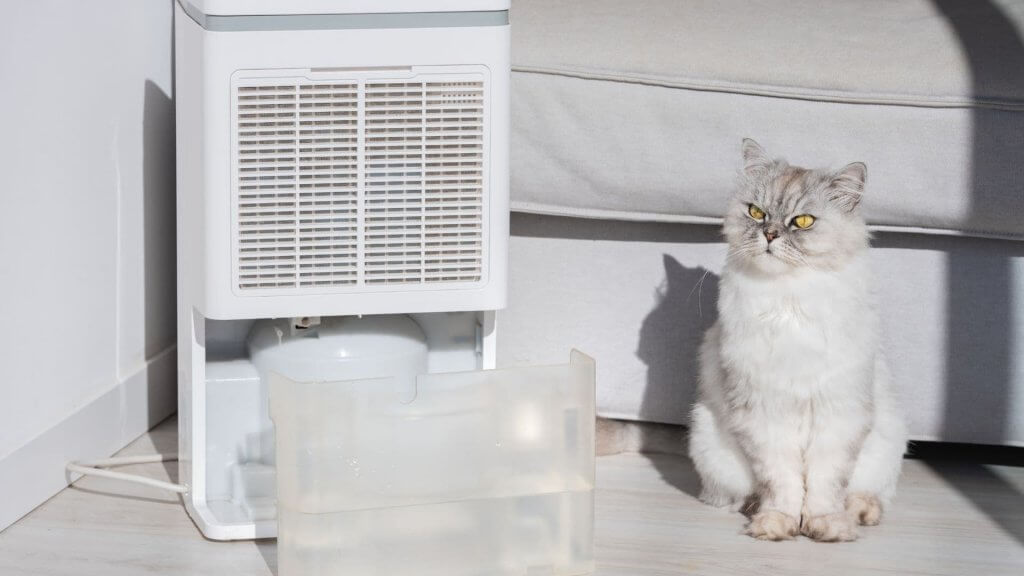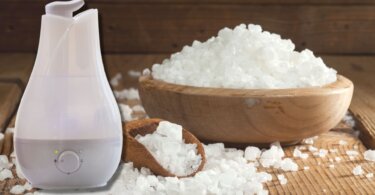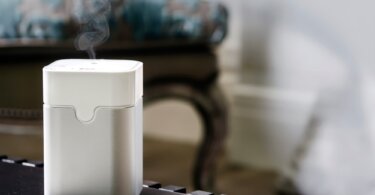Do you own a house dehumidifier? If so, you’re probably pretty happy with it since it can help reduce moisture and the humidity level of your indoor air. However, there are some drawbacks of dehumidifiers that you should be aware of before making this appliance your good friend.
Today, I’ll discuss the cons of using a dehumidifier so that you can make an informed decision about this smart appliance. So, instead of guessing the disadvantages of dehumidifiers, stick around and let me explain.
-
Primary Disadvantages of a Dehumidifier
- 1. Dehumidifiers Can Be Quite Loud
- 2. They Are Expensive to Run
- 3. Dehumidifiers Can Cause the Air to Feel Dry and Stale
- 4. A Dehumidifier Can Aggravate Respiratory Problems
- 5. Dehumidifiers Can Be a Fire Hazard
- 6. They Can Promote Mold and Mildew Growth
- 7. Dehumidifiers Are Difficult to Empty and Clean
- Summing Up

Primary Disadvantages of a Dehumidifier
Here are some issues you might face with a dehumidifier:
1. Dehumidifiers Can Be Quite Loud
Dehumidifiers are a great way to keep your home comfortable and reduce the risk of mold and mildew growth. However, they can be pretty noisy, which can be a significant downside for some people.
Dehumidifiers work by pulling air from the room and passing it over a cooling coil. As the air passes over the coil, water vapor condenses on the coil and drips into a collection tank.
The fan then blows the cooled, dehumidified air back into the room. This continuous cycle can produce a fair amount of noise, particularly if the unit is old or not properly maintained. This noise can be disruptive if you’re a light sleeper or need to concentrate on something.
Related article: Where To Place A Dehumidifier In Crawl Space And How To Install?
2. They Are Expensive to Run
Another disadvantage of using a dehumidifier is that these appliances consume quite a lot of electricity. Depending on the model, dehumidifiers can use anywhere from 100 to 400 watts.
This can significantly increase your electricity cost, especially if you’re running the unit for long periods. Some models do come with energy-saving features, but it’s still important to be aware of the actual cost before purchasing a dehumidifier.
Related article: How Long Should a Dehumidifier Run Per Day
3. Dehumidifiers Can Cause the Air to Feel Dry and Stale
When you use a dehumidifier, it pulls the moisture out of the air and collects it in a reservoir (usually a plastic container). This can help keep your living space feel comfortable and prevent mold and mildew from growing on moisture-laden surfaces.
However, it can also make the air feel dry and stale. This is because the dehumidifier is removing not only water vapor but also essential airborne molecules like nitrogen and oxygen.
As a result, the air can feel thin and dry, and you may experience symptoms like a scratchy throat, dry skin, and static electricity.
4. A Dehumidifier Can Aggravate Respiratory Problems
This is often a less discussed issue, but a dehumidifier can actually aggravate respiratory problems like asthma and allergies. This is because the dehumidifier removes water from the air, making the air dry.
But when you suffer from asthma or other allergic reactions, it’s essential to keep the relative humidity in your home at a comfortable level.
You can do this by using a humidifier rather than a dehumidifier. A humidifier adds moisture to the air to reduce airborne allergenes.
5. Dehumidifiers Can Be a Fire Hazard
Before you buy a dehumidifier, it’s important to understand how dehumidifiers can be a fire hazard if they’re not used properly. Dehumidifiers work by removing moisture from the air and storing this surplus moisture in a reservoir.
If the reservoir isn’t emptied regularly, the water can become stagnant and start to grow mold and mildew. In addition, the reservoir is typically located near the heating elements of the dehumidifier, which means that if the water becomes too hot, it can start to boil. If this happens, the boiling water can cause the reservoir to rupture, leading to an electrical fire.
To avoid this potential danger, be sure to empty the reservoir often and never leave your dehumidifier unattended when it’s turned on. Taking these precautions can help keep your home safe and comfortable.
6. They Can Promote Mold and Mildew Growth
When you hear the word “dehumidifier,” you probably think of a machine that helps to reduce the amount of excess moisture in the air. And while that’s true, air dehumidifiers can provide a suitable environment for mold growth if they’re not used properly.
The key is to empty the dehumidifier’s water storage tanks regularly, as the water that collects inside can create an ideal environment for mold and mildew to thrive.
Additionally, keep the dehumidifier clean and free of dust, as this can also lead to mold and mildew growth.
These simple precautions can ensure that your dehumidifier doesn’t unintentionally promote the growth of black mold and mildew.
7. Dehumidifiers Are Difficult to Empty and Clean
Dehumidifiers are a great way to keep your home feeling comfortable and refreshed, but regular maintenance can be a hassle. So, before investing in an air dehumidifier, consider this little disadvantage.
Dehumidifiers work by drawing extreme moisture out of the air and into a reservoir. You must regularly empty the water tank, or the dehumidifier will stop working effectively.
In addition, the dehumidifier’s water storage container can become moldy if it is not emptied frequently enough.
As a result, ongoing maintenance of a dehumidifier can be pretty time-consuming. However, if you’re willing to put in the effort, a dehumidifier can be a great addition to your home.
Related article: Can You Drink Water From a Dehumidifier?
Summing Up
Dehumidifiers reduce excess moisture levels in your home and make it more comfortable, but they’re not suitable for everyone. Before investing in this appliance, it’s important to weigh the pros and cons of dehumidifiers.
On the plus side, dehumidifiers can help reduce allergies and asthma symptoms, eliminate musty odors, and prevent the growth of mold and mildew. On the downside, dehumidifiers use a lot of energy and can be pretty noisy. They also need to be emptied frequently, which can be a hassle.
So, before you buy a dehumidifier, take the time to consider whether it’s the right choice for you. And if you do want to buy one, make sure you check out our selection of the best dehumidifiers for a basement.





Leave a Comment